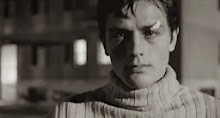Hoje, 8 de novembro, na Rua dos Bragas.
«Beautifully photographed and acted by an exquisite cast of children who never make a single move that is calculated or less than believable, Lore is the second film by the gifted director and co-writer Cate Shortland, after her acclaimed 2004 debut feature Somersault, which also dealt with a teenager’s sexual awakening in the face of adversity and challenge. But Lore delves even deeper, not only into the forced sacrifice of one girl’s childhood, but into the complicity with which so many Germans of all ages drank the Kool-Aid of organized insanity that led to criminal domination and international ruin. It’s a remarkable accomplishment.»
- Rex Reed, in Observer
«He [Thomas] and Lore do a wary dance of curiosity, attraction and repulsion. In a moment that strains credulity, Lore impulsively seizes Thomas’s hand and puts it up her dress. Yet Thomas remains poker-faced and inscrutable, even when Lore reflexively lashes out with an anti-Semitic barb. He offers no information about his past, and she doesn’t press him.»
- Stephen Holden, in The New York Times






















